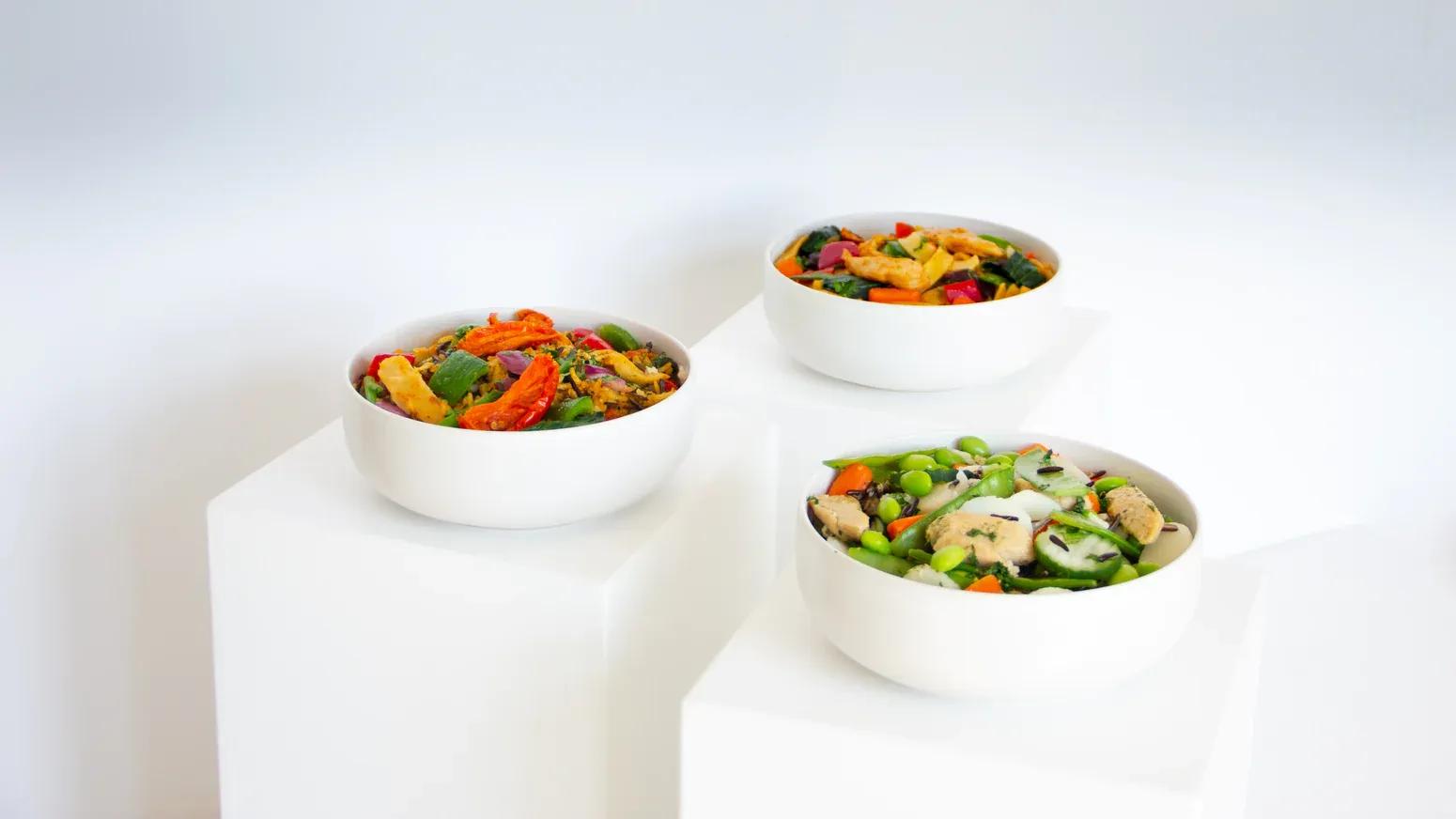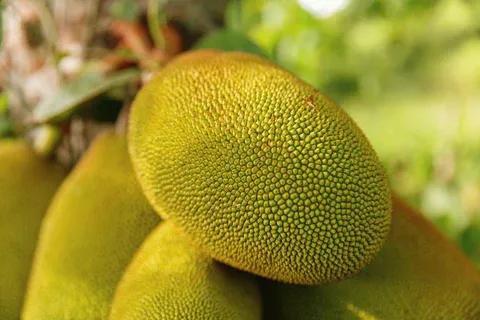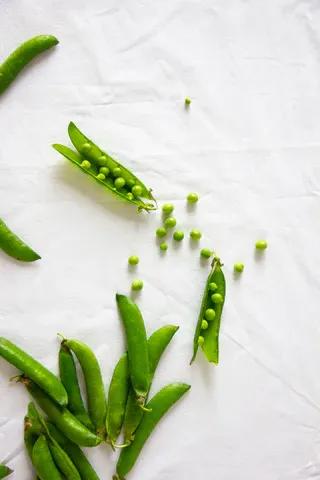Vegan Meat Alternatives – Everything You Need to Know
Vegan meat alternatives: what are they exactly and what options are available? How healthy are they and how you can make them yourself? Find out here.

Are you thinking about reducing your meat intake? Does a vegetarian/vegan diet appeal to you, but you love the taste of meat? Reducing or even eliminating meat from your diet, doesn’t have to mean that you have to eliminate the flavour or texture of meat. Nowadays, you can find vegan versions of burgers, sausages, nuggets and many other meat-varieties. Which vegan meat alternatives are out there, how healthy they are and how you can make them yourself? Find out below.
Contents of this article:
- For whom are vegan meat alternatives suitable?
- Which vegan meat alternatives are there?
- How healthy are meat alternatives really?
- Where can I find vegan meat alternatives?
- Making vegan meat yourself
- Which raw ingredients are suitable meat alternatives?
For whom are vegan meat alternatives suitable?
Many of us are aware that reducing our meat intake is beneficial not only for animal welfare, but also for the planet’s health. Incorporating vegan meat alternatives is therefore suitable for anyone wanting to reduce the environmental impact of their diet, without having to go completely vegan. If you're curious to learn more about a vegan diet read this article.
Vegan meat alternatives are a common sight on the plates of people who follow a vegan diet. Meat alternatives are very helpful, because they enable a replacement instead of an elimination of many favourite foods. Even though meat, fish and dairy products get an increasingly bad reputation for their environmental footprint, they are nevertheless important because they contain essential nutrients. Banning them from our diet is therefore not conducive to a healthy, nutritious diet, but rather swapping them out for more environmentally conscious alternatives is the way to go. Vegan meat alternatives kann offer a sufficient amount of protein, iron and omega-3 fatty acids that our body needs.
Whether you’re barbecuing, grilling or preparing your favourite bolognese, the diversity and quality among vegan meat alternatives is cause for celebration among vegan eaters. No wonder, not only are these products delicious, they bear an uncanny resemblance to their original animal-based counterparts.

Which vegan meat alternatives are there?
Schnitzel made from soybeans, meatless burgers or chicken made from pea protein–the demand for plant-based alternatives is increasing and the industry is (thankfully) responding! Find a summary below of the diverse products available in supermarkets today.
- Tofu
Tofu is made from condensed soy milk from soybeans, which is pressed into solid white blocks (similar to cheese making). The texture can range from silky to extra firm, depending on the pressing process. Tofu is an excellent protein source for vegan eaters. Although originally found in Asian cuisine, Tofu today has international relevance and has proven to be a very versatile ingredient. It can be eaten as a bread topping, a component in a tofu or a crispy salad enhancer–tofu can be eaten any way you want. In addition to regular natural tofu, you can find a variety of flavoured tofu too such as smoked, spiced or marinated.
- Tempeh
Tempeh comes from traditional Indonesian cooking. It is produced through the process of fermenting soybeans. Whether eaten pure or marinated, Tempeh is particularly popular in salads, curries, as a side for vegetables, or as an alternative to minced meat. Due to the fermentation process, Tempeh is also a great option for individuals who have a soy intolerance (still get tested before and consult a doctor). In addition, Tempeh is high in fibre, secondary plant substances and also contains antioxidant properties.
- Seitan
A favourite in Japanese cooking: Seitan. This consists of primarily one ingredient: Gluten. People who suffer from a gluten intolerance or celiac disease, should avoid Seitan. For everyone else, Seitan is a great meat alternative thanks. Its meat-like texture makes it an ideal ingredient with which to make steaks, sausages, burgers etc. For adventurous cooks and aspiring chefs out there, you can even try and make Seitan yourself–its basically just one ingredient!
- Lupines
While Tofu, Tempeh and Seitan are fairly well known in the vegan food world, Lupine-based products are quite new in comparison. Lupines belong to the legume family. They are high in protein, minerals and trace elements, including some essential amino acids. Things like vegan yoghurt, ice cream, meats, hams and even flour can be produced from lupine protein.
- Soybeans
Meat alternatives like soy-schnitzel, soy-sausage or soy-mince originate from, you guessed it, soybeans are becoming increasingly popular even among individuals who are not vegan. The consumption of soy is often criticised, especially with regard to environmental factors - however, the problems surrounding soy cultivation are more an issue for meat eaters than they are for vegans. After all, a steak contains a lot of soy in the form of animal feed. For vegan eaters, soy products are a good source of protein that also contain unsaturated fats, B vitamins, minerals and trace elements.
- Jackfruit
This ingredient originates from the tropics, and is suitably still considered fairly exotic in the realm of vegan meats. Its meat-like texture makes it a very effective meat replacement, especially for those who like pork, and therefore a popular ingredient. Delicious pulled pork, gulasch or stir frys can be just as tasty in a plant based version.

- Pea Protein
Plant based meat alternative made from peas? Yes, it’s true! For those of us who wished peas never landed on our plates as children, have to pick up their jaws off the floor today because the pea-protein industry is taking the world by storm. We’re just as surprised as you are. Who knew that milk made from peas, or pea-based chicken could taste good? Not only is the taste remarkable, but so is the nutritional value of peas: rich in protein, iron, magnesium and essential amino acids. For more information on vegan protein sources read our other article.
Even some of our Every. Bowls contain this magical food. Our collaboration with the Swiss company Planted. resulted in the delicious creation of three bowls with vegan chicken from pea protein. Curious? Then try our Tikka Masala or Umami Rice! Discover our entire menu here.
How healthy are they, really?
Environmental scientists and experts have been raising the alarm for some time now in regard to our consumption of animal products and the unsustainable and detrimental effect this has on the environment. More and more people are proactively making the switch by recognising the indisputable link between animal consumption and the impact on animal welfare, the environment as well as personal health. It is a well known fact that a vegan diet is an excellent way to reduce our individual impact on the environment, while also protecting animals.
But are plant based meats also better for us? That depends on the specific food. Here we advise researching before trying, and to better understand what ingredients are in these foods, and what is involved in their production.
Some vegan meats are heavily processed and contain high amounts of sugar, salt, fat and unwanted additives to make the resemblance to the original product as convincing as possible. Compared to animal products, vegan alternatives rank fairly high on the nutritional scale. Those originally made from soybeans, lupines or peas will have high among of protein, fibre, essential amino acids, minerals and trace elements.
To avoid the bad from the good, make sure to read ingredient labels before buying vegan meats. If you find added sugar, flavour enhancers or other unwanted additives, don’t buy it. A general good rule of thumb is: the shorter the ingredient list, the better.
Where can I find vegan meat alternatives?
A few years ago, the search was likely to be futile, or at the very least bland. Luckily, you can find a multitude of vegan meat products in most supermarkets. Of course, the range will vary from place to place, but regardless of whether you shop in an organic or discounted store, you’ll definitely find something.
The restaurant industry is also catching up. More and more menus and even fast food chains are featuring vegan alternatives: all the way from burger chains, to sushi, to kebabs: the options keep on increasing. Fewer people are having to make the touch choice of vegetable vs. meat–now you can have both! (sort of).
For those of us currently too lazy or busy to cook or visit a restaurant, you're in luck. Every. Also features meals with vegan meats. Try Tikka Masala or Umami Rice or just browse through our website. All you have to do is choose and checkout. Done!
Making vegan meat yourself!
And in contrast, for those of us with extra time or energy: making your own vegan products is also easy! We’re not talking about cashew-cream or a lentil bolognese, no we mean patties, burgers and hams! The internet is full of suitable recipes for you to discover. And added bonus: if you’re making it yourself, then you know exactly what’s in it.
Which raw ingredients can be made into meat alternatives?
As we’ve established, many ready-made vegan meats can be produced from legumes, grains etc. But what about raw ingredients that can be found at home? What can be made from those you ask?
- Oats, Bulgur and Co.
Oats not only give you a great bang for buck, they’re also ideal for making things like patties or fritters. All you need to do, is make a dough out of oats, vegetables (e.g. carrots or zucchini), legumes (lentils, beans) and a vegetable broth. What many don’t know: oats are not only a great source of carbohydrates, but are also rich in protein, unsaturated fats, minerals, trace elements and secondary plant substances.
Other grains like bulgur or green spelt can be utilised easily. Bulgur is particularly popular in Turkish cuisine and is a great substitute for minced-meat dishes like a chilli or a bolognese, or can be used to stuff vegetables or vine leaves. Green spelt is spelt that is harvested prematurely and dried. This is also a great ingredient to create fritters or even bread spreads.

- Lentils, Chickpeas and Beans
Lentils, chickpeas and beans are all great alternatives to meat. Wholesome and high in nutrients. Whether you put them in a curry, stew or power bowl or transform them into burger patties–legumes of these kinds always taste delicious and provide you with important nutrients. Lentils and beans are low in fat and rich in protein, iron and fibre. Chickpeas contain more protein as many kinds of meats (!) and have similar calcium levels as regular cow milk. They are also rich in iron and fibre.
- Mushrooms
Mushrooms, really? Yes, really. Thanks to their meaty texture and excellent flavour profile, mushrooms are an ideal (and very popular) alternative to meat. Portobello mushrooms are frequently featured as a vegetarian or vegan burger alternative. Large, easy to marinate and compatible with typical forms of cooking used for meat. Shiitake mushrooms also have a meaty texture and umami flavours, perfect to add to a soup, stew or ragout. Other mushrooms like oyster or button mushrooms can also enhance any vegan meal.

In conclusion, ready-made vegan meat substitutes made from soybeans, pea protein and the like can be a healthy and nutritious alternative in vegetarian or vegan diet, as long as the products are not contaminated with flavourings and additives through industrial processing. If you don't want to eat any unwanted or unfamiliar ingredients, make sure to take a look at the ingredient list before buying.
And let's be honest: vegan schnitzels, burgers and the like mainly provide more variety on your plate, but they are not absolutely necessary for a balanced diet. Many of these substituted products ultimately consist only of raw vegetable ingredients such as grains or legumes, which can also be integrated into meals in their original form.
If you enjoyed this article, then you'll definitely want to read these too!
- Vegan Protein Sources – The Key Facts
- Quick and Healthy Lunch? Easy as Pie
- Gluten-Free Eating – More Than Just a Food-Trend
- Healthy and Long-Term Weight Loss
- Healthy Dinner – What's Best for You and Your Body
For even more foodie-content follow us on Instagram and join the Facebook Community to get involved in meal creations and to stay up to date on all things Every.

